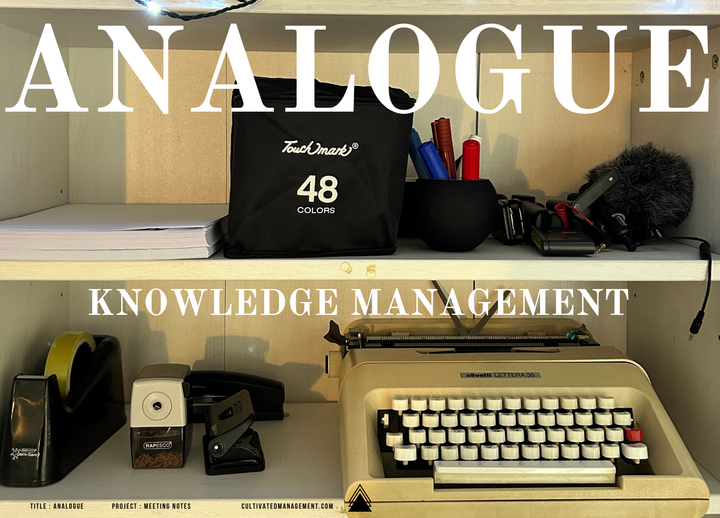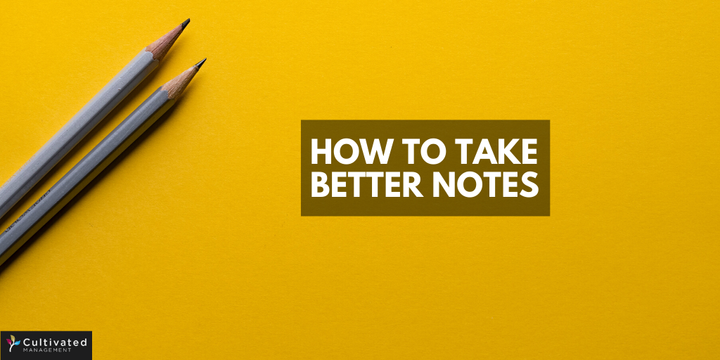The power of journaling - journaling for mental clarity

Journaling (or journalling) has been a lifeline for me. Journaling helps me work out who I want to become, work through difficult times and deal with emotions I used to let plague me for days.
There really is power in journaling.
I flitted around for years trying to keep a journal. I’d keep to the routine for a few weeks, then fail miserably and not journal for months.
It has only been in the last year that I’ve developed this habit – and it’s made a massive difference to me and my life.
After all, the core philosophy of Cultivated Management is that our management will never be more or less than us as a person.
So, if we want to be better at work, more focused and calmer to be around – we must work on ourselves. And that’s just what journaling has done for me.
In this post and video, I’m going to share some ideas about journaling, from why it’s beneficial to how I do it. And if you watch the video, you’ll get to see some beautiful b-roll of wild horses at Danebury Fort. How could you miss that?
Journaling and the Science behind it
There are many reasons to journal; from working through a traumatic experience, dealing with depression, driving out creativity, documenting your life to improving long term memory.
I journal for all of these reasons. It’s a place to store notes, ideas, thoughts, my day, my emotions and words about who I am trying to become.
I’ve found many benefits indeed for journaling.
Don’t just take my word about the benefits of journaling.
There is plenty of scientific evidence to suggest it’s good for us as humans.
- Research suggests that expressive writing could help to reduce symptoms of cancer in patients who develop the habit of journaling / expressive writing (Milbury et al., 2014) [1].
- It can also help people to deal with depression and lower the frequency of ruminating thoughts (Gortner, Rude and Pennebaker, 2006) [2].
- Research also suggests that journaling and expressive writing can free up mental capacity and working memory. (Klein and Boals, 2001) [3]
- It can also help us to deal with anxiety, mental distress and perceived stress. (Smyth et al., 2018) [4]
- Journaling also enables us to recover from surgery and illness quicker, according to this interesting research. (Rodriguez, 2013) [5]
- The act of writing down tomorrow’s tasks and getting things out of our head can help us sleep better. (Scullin et al., 2018) [6]
- It helps when dealing with a breakup (Slotter and Ward, 2014) [7], can help us get over traumatic events in our lives (Baikie and Wilhelm, 2005) [8] and also helps us to learn more effectively. (Harvard Business School, 2014) [9]
When to journal
There are no hard and fast rules on how to journal, do what you can and try to make a routine out of it.
I tend to journal in the morning. I get up at 5:45am every day and put the kettle on. I make a coffee, switch on my SAD lamp and journal for 5-10 minutes.
Some people journal in the evening. Some in the morning. Some throughout the day.
It’s what works for you. If you try to do what someone else does, but it proves unsuitable or too hard, then you won’t develop the habit. And the habit is important.
So, journal when you can, and make it work for your routine.
What to journal
Journaling has many benefits as listed above.
For me, I use it to get thoughts out of my head and on the paper. It’s a form of therapy. I don’t have any set rules, templates or format. I just write.
Some days I write about what I’ve been up to that day, or the day before. Sometimes I write about how I feel. Sometimes I write about who I want to become. And sometimes I just get whatever is in my head out and on to paper.
I simply write the date at the top of a page – and write.
I use my journal for getting things out of my head. Sometimes these things are emotions and feelings. Sometimes ideas and world domination. Sometimes it’s simply to document what I’ve been up to.
I journal for myself, not for others. But there is part of me that wonders whether my boys (or future generations of the Lamberts) would be interested in reading these archives 🙂
How to journal
I spent a few months last year journaling digitally, but it felt wrong to me.
I then switched to a Moleskine A5 softbound notebook (pages don’t bleed), coupled with a cheap Parker Fountain Pen (olds cool) and it felt good.
Find what works for you.
I will say that the non-electronic aspect of using a notebook and pen has a lot of advantages.
- There is no blue light omitting from the screen which has health benefits, especially if you journal in the evening.
- You will not be distracted by emails, social media or the siren call of work.
- Writing by hand has a direct link to memory – I found that when I started writing by hand my head felt clearer and I was able to get my real thoughts down on paper.
Serendipity and a legacy
One final thought on the art of journaling.
There’s a level of serendipity that comes from flicking back through the pages of a journal. The content may provide a wry smile, demonstrate how far you’ve come in your healing or personal journey, or sometimes trigger an idea for the next part of your life journey.
As mentioned earlier, your words could also be a legacy of you for future generations.
Journaling for work
This is a work blog after all. Journaling is typically a personal activity and is about you as a person. That doesn’t mean you can’t use journaling in your workplace.
When I lead teams, I keep two journals.
One for my home life for me as Rob Lambert. The other one stays at work (locked away!) and is for me, Rob Lambert – The Manager and Leader. In this journal are strictly reflections of myself in the workplace.
- Was I the manager I wanted to be that day?
- Did I hold the high bar of behaviours?
- Did I do the right thing?
- Could I be better tomorrow?
- How can I grow into the role and develop as a person?
- Did I perform the right action, stand up for the right things and act in accordance with my values?
My goal at work is to be the best manager and leader I can be, and journaling is a good way to reflect on whether I am living up to that standard.
I believe good leaders and managers are hard on themselves, set high standards for others, but are forgiving with those around them.
A journal helps me stay true to that.
Bibliography
[1] Milbury, K., Spelman, A., Wood, C., Matin, S.F., Tannir, N., Jonasch, E., Pisters, L., Wei, Q. and Cohen, L. (2014). Randomized Controlled Trial of Expressive Writing for Patients With Renal Cell Carcinoma. Journal of Clinical Oncology, [online] 32(7), pp.663–670. Available at: https://www.ncbi.nlm.nih.gov/pmc/articles/PMC3927735/ [Accessed 25 Apr. 2019].
[2] Gortner, E.-M., Rude, S.S. and Pennebaker, J.W. (2006). Benefits of Expressive Writing in Lowering Rumination and Depressive Symptoms. Behavior Therapy, 37(3), pp.292–303.
[3] Klein, K. and Boals, A. (2001). Expressive writing can increase working memory capacity. Journal of Experimental Psychology: General, 130(3), pp.520–533.
[4] Smyth, J.M., Johnson, J.A., Auer, B.J., Lehman, E., Talamo, G. and Sciamanna, C.N. (2018). Online Positive Affect Journaling in the Improvement of Mental Distress and Well-Being in General Medical Patients With Elevated Anxiety Symptoms: A Preliminary Randomized Controlled Trial. JMIR Mental Health, [online] 5(4), p.e11290. Available at: https://www.ncbi.nlm.nih.gov/pmc/articles/PMC6305886/ [Accessed 28 Sep. 2020]
[5] Rodriguez, T. (2013). Write to Heal. Scientific American Mind, [online] 24(5), pp.17–17. Available at: https://www.scientificamerican.com/article/writing-can-help-injuries-heal-faster/ [Accessed 28 Sep. 2020].
[6] Scullin, M.K., Krueger, M.L., Ballard, H.K., Pruett, N. and Bliwise, D.L. (2018). The effects of bedtime writing on difficulty falling asleep: A polysomnographic study comparing to-do lists and completed activity lists. Journal of Experimental Psychology: General, [online] 147(1), pp.139–146. Available at: https://pubmed.ncbi.nlm.nih.gov/29058942/ [Accessed 28 Sep. 2020].
[7] Slotter, E.B. and Ward, D.E. (2014). Finding the silver lining. Journal of Social and Personal Relationships, 32(6), pp.737–756.
[8] Baikie, K.A. and Wilhelm, K. (2005). Emotional and physical health benefits of expressive writing. Advances in Psychiatric Treatment, [online] 11(5), pp.338–346. Available at: https://www.cambridge.org/core/journals/advances-in-psychiatric-treatment/article/emotional-and-physical-health-benefits-of-expressive-writing/ED2976A61F5DE56B46F07A1CE9EA9F9F [Accessed 28 Sep. 2020].
[9] Giada Di Stefano, Francesca Gino, Gary Pisano, and Bradley Staats https://www.sc.edu/uscconnect/doc/Learning%20by%20Thinking,%20How%20Reflection%20Aids%20Performance.pdf
Other interesting sites
Scientist uses two journals to tie together patterns in thinking to help her become a better scientist.
Virginia Woolf on keeping a journal at Brain Pickings.
The Art of Journaling from Daily Stoic.


